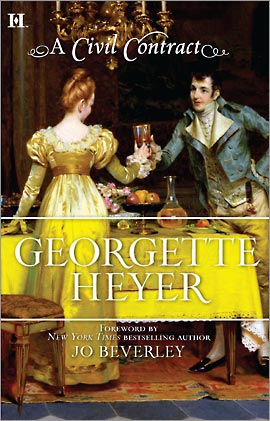In Ken MacLeod’s Cosmonaut Keep you can buy porn openly, but romance novels are sold under the counter in brown paper bags. Similarly in this world I’ve heard people talking about romance as porn for women, as if romance was filling some sort of erotic need. I think there are certainly some people who are wired that way, like one of the characters in Barbara Vine’s The Brimstone Wedding. I am not one of those people. The romances in fiction do not do much for me, and after reading a slew of romances when I was reading absolutely anything there was because it was there, I pretty much decided I only liked gothics.
I started reading Georgette Heyer years after that because people kept saying that Lois McMaster Bujold’s Shards of Honor was like a romance novel, and I finally asked them where were the romance novels that it was like? Everybody mentioned Heyer, who wrote between the 1920s and the 1960s, with most of her best books being written during WWII. I started reading Heyer’s regency romances at random and didn’t find them much like Bujold, except in that they have great witty dialogue. If I liked them I generally liked them despite the romance, rather than because of it. Sylvester, for instance—can anyone really imagine those two will be together two weeks after the end of the book? I noticed that the less plot they had the better they tended to be. Nobody can write books in which nothing significant happens better than Heyer, she’s much better at rapier wit than actual swordplay, and at making tiny events cascade than at making drama plausible. I then read some of her books that are set outside the Regency, and I found she had far less skill at evoking other periods—her medieval dialogue was just embarrassing. Then I found A Civil Contract, which is far and away her best book, a romance I think many people can enjoy, even those who don’t much like romance.
Most of Heyer’s books take place in a vague world of 1800-1815, and most of the ones that have specific years and feature actual historical events are much less good. A Civil Contract takes place quite specifically between 1813 and 1815, and could take place at no other time. It’s the story of Captain Adam Deveril, recently become Viscount Lynton on the death of his profligate father, and how he gives up what he imagines to be true love with the flighty Julia to marry an heiress from a vulgar family and save his family fortunes. The majority of the book is set after the marriage, and is about the way two strangers come to live together and learn what love means.
Unlike all the other romance heroines in the world, Jenny is short, fat, and plain, and she doesn’t miraculously stop being these things. She’s also shy, and shyness makes her sometimes brusque. Her father is a wealthy merchant, and her sensibilities sometimes appal Adam’s more refined expectations. Now Adam is good-looking, and sensitive, and he has been a soldier for years and never wanted to be a land-owner. He’s also very particular and easily hurt, and he relies on good manners to get him through all kinds of situations where having a frank conversation might be a better idea. Adam winces away at the wrong times, especially from Jenny’s appalling father.
There’s none of Heyer’s weirdly vile racism here, because we don’t see anyone to provoke it. There’s not much of her odd classism either—she does claim that the fact that Jenny’s mother was a farmer’s daughter gives Jenny an instinctive liking for the country, but generally the whole class issue is centre stage here and dealt with very well. Jenny is admirable, despite all her disadvantages, her father is vulgar but a good person, Adam’s mother is a much less likeable person. Because she has to write about class directly and dead on, she can’t be obliquely odd about it, and it works.
Although the entire story is set in England, and the scene is mostly either London or the fen country, the whole plot rests on the Battle of Waterloo. Some people like Heyer’s book directly about Waterloo, An Infamous Army. That bored me, but I really like the way the history weaves in to the small scale character plot here, in just the way history does affect people’s lives.
There are no heaving bosoms here, no sudden romantic kisses, nobody is swept off their feet and those who want to be are not treated kindly by the text. It’s a relatively psychologically realistic study of people forced into intimacy and becoming comfortable together, in a stately home in the fens in 1815, while Napoleon escapes from Elba. It’s not a long book, I tore through it in an afternoon. Heyer’s generally comfort reading for me, and this is a thoroughly enjoyable and comforting story, and it quite cheered me up.
Most of Heyer is back in print in the UK now, and much of it is also being published in US editions, so with luck you should be able to get hold of it if you want it.
Jo Walton is a science fiction and fantasy writer. She’s published eight novels, most recently Half a Crown and Lifelode, and two poetry collections. She reads a lot, and blogs about it here regularly. She comes from Wales but lives in Montreal where the food and books are more varied.










